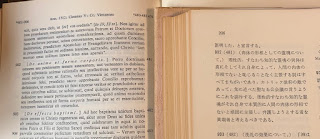Concilium fall 2021 M. Handy, American revolution, p. 452-453.
MICHAEL HANBY
Noce's genius was to recognize that the root of the
political crisis in the West is not itself political but metaphysical
and religious.' At its core is the elevation of becoming over
Being-in a word, anti-Platonism. "Every revolutionary
of traditional values," he writes, "depends upon this
Initial negation."7 The primacy of becoming replaces the vertical transcendence of eternity with the horizontal transcendence of
futurity. The negation of transcendence eliminates the possibility of "intellectual intuition," an apprehension of being in its
enduring intelligibility, truth, and goodness.' Gone, then, is the ground of the '"religious dimension" presupposed in any genuine act of faith, whose absence sets in motion a historical course
from the atheism in which God is denied to the irreligion in
which the question of God can no longer be asked meaningfully. Gone also is any possibility of traditional theoria. Speculative
————-
5. CM, 140 (emphasis original).
6. CM, 228.
7. CM, 58.
8 Primacy of contemplation just means the superiority of the in
changeable. It just expresses the essential metaphysical principle
atholic tradition, which says that everything that is participates nece
ersal principles, which are the eternal and immutable essences contai
in the permanent actuality of the divine intellect" (AS, 241).
9. See CM, 198; AS, 230.
452
AMERICAN REVOLUTION
Contemplative thought is unintelligible, thoroughly
philosophy of praxis." Truth itself is ether measured
efficacy of the action--"the historical reality it is a
roduce"-or it is reduced to historical, sociological, on
chological conditions and functions, that is, to ideology.'
From the anti-Platonic vantage point, the world is "a
stem of forces, not of values."11 The primacy of force elevates
politics over ethics-indeed over everything--even as the nega-
tion of universal reason and human nature undermines the basic
condition of possibility for a genuinely political society: a world
of shared meanings and a common good. Herein lies the novelty
of the new totalitarianism according to Del Noce. It "is not that
of a political movement that aims at world domination" it is,
rather, a wholly negative phenomenon--anti-racist, anti-fascist,
etc.ㅡ"marked by a quest to bring about a disintegration of one
part of the world"' in the name of freedom.12 It is total war le-
gitimated by its perennial opposition to fascism, falsely defined
as whatever sins "'against the progressive direction of history.'1'3
Total revolution could only succeed by bringing the
whole of human nature within its purview, that is, in sexual rev-
lution.14 One of Del Noce's greatest insights is that"scie
and "eroticism" form a unity. They are but two sides of the same
ontological coin and are mutually efficacious in advancing total
revolution. Together, they annihilate all but the barest "biolo-
gistic" conception of human nature with its vital energies. "Na-
ture" is simply whatever can be observed, which means anything
is just as natural--or unnatural--as anything else. The family
must be dissolved; only then can the "meta-empirical order of
truth" finally be abolished.15 The fundamental realities of human
nature--man, woman, mother, father, child--must be perpetu-
ally redefined. History must be erased, since the past is oppres-
sive, by definition, and language, morality, and law must all be
10. CM, 61.
11. CM, 232.
12. CM, 87.
13. CM, 101.
14. See CM,
15. CM, 161
iPhoneから送信








